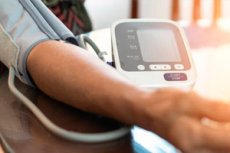New publications
High blood pressure in middle age may increase dementia risk
Last reviewed: 29.06.2025

All iLive content is medically reviewed or fact checked to ensure as much factual accuracy as possible.
We have strict sourcing guidelines and only link to reputable media sites, academic research institutions and, whenever possible, medically peer reviewed studies. Note that the numbers in parentheses ([1], [2], etc.) are clickable links to these studies.
If you feel that any of our content is inaccurate, out-of-date, or otherwise questionable, please select it and press Ctrl + Enter.

There are currently about 1.28 billion adults worldwide between the ages of 30 and 79 living with high blood pressure, known medically as hypertension.
Although high blood pressure tends to be more pronounced in older adults aged 60 and older, recent studies show that hypertension rates are on the rise in young adults between the ages of 20 and 44.
People with high blood pressure are at increased risk of developing many health conditions, including stroke, heart attack, heart failure, kidney problems, vision problems, and dementia.
A new study recently published in the journal hypertension ResearchTrusted Source, found that high blood pressure may also increase the risk of dementia in the middle-aged population.
Highest risk of dementia is associated with hypertension in middle age
For this study, researchers analyzed data from 1,279 people from Argentina with high blood pressure between the ages of 21 and 95. All data were taken from the Heart-Brain Study in Argentina, including information on blood pressure and cognitive impairment.
Researchers then determined the CAIDE Trusted Source dementia risk score (Cardiovascular Risk Factors, Aging, and Incidence dementia ) for each study participant. The CAIDE score takes into account information about blood pressure, cholesterol levels, obesity, physical activity, age, and education level.
Their analysis showed that 28% of people in the middle-aged age group - those aged 47-53 - had an increased risk of developing dementia.
"It is in midlife that risk factors have the greatest impact," Augusto Vicario, M.D., M.P.H., cardiologist and head of the Heart and Brain Division of the Department of Clinical Cardiology at the Cardiovascular Institute in Buenos Aires, Argentina, corresponding author. Of the study. Of this study.
"In the case of hypertension, it has been shown that hypertension in middle age increases the risk of developing dementia later in life, but because hypertension starts later in life, this risk is reduced. This is because cerebral vascular disease develops slowly and takes more than 10 or 15 years to manifest clinically as a cognitive disease."
- Augusto Vicario, MD.
Hypertension is associated with a higher risk of dementia in general
Researchers also found that about 40 percent of all study participants, regardless of age, had an increased risk of developing dementia.
"When you consider that the only intervention that has been shown to stop or slow the progression of cerebral vascular lesions in hypertensive patients is the treatment and control of hypertension through pharmacologic and non-pharmacologic measures, it is not surprising that 40% of patients have an increased risk of developing dementia, given that 70% of hypertensive patients do not control their blood pressure or are even more unaware of their disease and untreated," Vicario said.
"Physicians should include the brain in the clinical assessment of their hypertensive patients to adequately stratify cardiovascular and cerebrovascular risk. "A simple and practical way is cognitive assessment with neuropsychological tests," he advised.
"And secondly, we must emphasize early detection of hypertension, adequate control of it with antihypertensive drugs, and increased adherence to treatment because it will last forever," he said.
Why is hypertension linked to dementia?
Although hypertension is a known risk factor for dementia, the link requires further study, Vicario said.
"The brain is one of the three target organs of hypertension, [along with] the kidneys and heart; however, its evaluation is bypassed in routine clinical practice," he explained.
"Our studies, according to international publications, have shown that 30% of hypertensive patients have brain damage without kidney or heart damage. Thus, the brain of hypertensive patients is a "risk brain".
- Augusto Vicario, MD.
"[Since] dementia is an incurable but preventable disease with exponential growth, vascular disease is the underlying cause of more than 90% of dementia cases, including alzheimer's disease, and hypertension is a major modifiable vascular risk factor for dementia, it is critical to study the hypertensive brain," he added.
